
MA Bingo Regulations
Chapter 271: Section 22B Beano; sale of lottery tickets
Section 22B. Nothing in this chapter shall authorize the prosecution, arrest or conviction of any person for promoting or playing, or for allowing to be conducted, promoted or played, the game commonly called beano, or substantially the same game under another name in connection with which prizes are offered to be won by chance or for selling lottery tickets or shares; provided, said game or sales are conducted under a license issued by the director of the state lottery, under the provisions of sections thirty-seven or thirty-eight of chapter ten.
STATE LOTTERY COMMISSION
Chapter 10: Section 37 Sale of lottery tickets in conjunction with game of beano; licensing of certain organizations; restrictions; gross profit minimum; payment of prizes; apportionment of revenue
Section 37. The director may license any organization licensed to conduct the game of beano under the provisions of section 38 to sell lottery tickets or shares; provided, that such tickets are sold only on the premises of said organization for which such license has been issued; and provided further, that the funds derived therefrom shall be used exclusively for educational, charitable or religious purposes. The commission shall sell lottery tickets to such licensed organizations and any such licensed organization reselling such tickets shall not be subject to prosecution for setting up and promoting a lottery or any other crime incidental thereto or for selling or having in its possession said lottery tickets.
The commission shall sell lottery tickets to such licensed organizations and shall determine the price at which said licensed organizations shall resell said tickets, which price shall be printed on each ticket. Each licensed organization shall be entitled to retain as gross profit not more than 30 per cent of the resale value of tickets sold by it, and shall be solely responsible for paying prizes won by tickets sold by it, which prizes shall be determined by the commission and be not less than 45 per cent of the resale value of said tickets.
The commission shall sell lottery tickets to said licensed organizations for 10 per cent of their resale value. The revenue derived by the commission from said sales of lottery tickets shall be apportioned as follows: (1) for the payment of costs; provided, however, that notwithstanding the provisions of section 25, the costs incurred by the commission in the operation and administration of the activities authorized by this section, including the expenses of the commission and the costs resulting from any contract or contracts entered into for promotional, advertising or operational service or for the purchase or lease of lottery equipment, materials and tickets, in no case shall exceed one half of said revenue, subject to appropriation; (2) the balance of said revenue, as determined by the comptroller on June 1 and December 1 of each year, shall be credited to the Local Aid Fund established under the provisions of section 2D of chapter 29 to be distributed in accordance with the provisions of section 18C of chapter 58.
Organizations licensed under this section shall be considered sales agents for the purposes of this chapter. Activities authorized by this section shall be subject to all provisions of the state lottery law not inconsistent herewith.
Section 38. Any fraternal organization having chapters or branches in at least one other New England state, or any corporation organized under the provisions of chapter 180, any religious organization under the control of or affiliated with an established church of the commonwealth and any veterans’ organization incorporated or chartered by the Congress of the United States or listed in clause (12) of section 5 of chapter 40, any volunteer, non-profit fire company or similar organization furnishing public fire protection, any voluntary association for promotion of the interests of retarded children, the Boston Firemen’s Relief Fund, any volunteer, non-profit organization furnishing a public ambulance service, and non-profit athletic associations, desiring to operate or conduct the game commonly called beano, or substantially the same game under another name, in connection with which prizes are offered to be won by chance, may upon application to the state lottery commission be granted a license to conduct said game in a city or town which has voted to allow granting of licenses for the operation, holding or conducting of said game therein; provided, that the application of such organization is in the case of a city, other than the city of Boston, approved by the majority of the city council and approved by the mayor, in a town by the board of selectmen, and in the city of Boston by the licensing board for said city; and provided further, that such organization has been in existence for at least five years immediately prior to the date of making application for such license.
The fee for such license shall be determined annually by the commissioner of administration under the provision of section 3B of chapter 7. The proceeds of said fees shall be paid into the treasury of the commonwealth and shall be used by the commission to defray the cost of administering this section, subject to appropriation.
Such license may be revoked at the discretion of the director and shall be suspended or revoked upon written request to the director by the city or town approving authority as set forth above in this section. The action of the director in suspending or revoking a license shall be final, and the licensee shall not have a right of appeal.
Each organization licensed shall be limited to conducting such game to two days in each calendar week; provided, however, that on one of such days each license shall limit the playing of said game to the hours between 6:00 p.m. and 12:00 midnight and on the other of such days said license shall limit the playing of said game to the hours between 1:00 p.m. and 6:00 p.m. and said days and appropriate times shall be set forth in the license.
On not more than three occasions in one calendar year a licensee may change the date on which such beano game is to be conducted; provided, however, that the new date falls on the same day of the week according to the terms of the license; and provided, further, that said licensee shall notify the commission of such change no less than 30 days prior to said new date.
No licensee shall give a prize that exceeds $100 in value except as otherwise provided in this paragraph. A licensee may conduct: (a) games incorporating bonus cards, which shall increase the prize in direct relation to the cost of said bonus cards, and which shall in no event increase the prize by more than 100 per cent; (b) special games, so-called, for which prizes shall not exceed $500 in cash or merchandise; (c) two winner-take-all games, so-called, on any one day on which the licensee is authorized to conduct beano, which may be multiple games or a series of games, for which prizes shall be equal to all receipts from the sale of beano cards for said winner-take-all games less 10 per cent to cover the costs of supplies for said winner-take-all games, and taxes due the commonwealth under the provisions of section 39, except that no single prize so awarded shall exceed $500 in either cash or merchandise; (d) four 50-50 games, so-called, on any one day on which the licensee is authorized to conduct beano, for which prizes shall equal 50 per cent of the receipts, after taxes, of said games, except that no single prize so awarded shall exceed $1,200; and (e) two progressive jackpot games, so-called, for which the total accumulated prize shall not exceed $3,000. A licensee may award a good neighbor prize, so-called, which shall not exceed 10 per cent of the announced prize for a given game. When more than one player is a winner on the call of the same number, the designated prize shall be divided equally to the next nearest dollar; provided, however, that if a licensee so elects, no winner shall receive a prize which amounts to less than 10 per cent of the announced prize and that in such case the total of said designated prizes may exceed the applicable statutory limit of said game. In addition to the prizes allowed by this paragraph, a licensee may award a door prize or prizes, the aggregate value of which shall not exceed $200 in cash or merchandise.
No alcoholic beverages shall be sold, dispensed or consumed in that portion of any building or premises of the licensee during the hours such game is being conducted.
No person under 18 years of age shall be permitted in that portion of any building or premises of the licensee during such time as such game is being played.
No game shall be advertised or publicized by sign or billboard beyond the city or town limits covered by each license.
Any organization licensed under this section to conduct said game shall operate, manage and control said game by members in good standing of the local branch of said organization, members in good standing of its recognized auxiliaries and, at the sole discretion of the director, their immediate family members.
If an organization licensed to conduct beano fails to exercise exclusive control and management of said game, or fails to have one of its members in good standing in full control and management of the game at all times during its operation, it shall be punished by a fine of not more than $3,000.
The profits of any game licensed to be conducted under this section shall be the property of the organization conducting said game, and shall be used for charitable, religious or educational purposes, and shall not be distributed to the members of such organization. No person shall be entitled to a percentage of any money received as a result of conducting said game.
Accurate records and books shall be kept by each licensee showing the total amount of all monies deposited by people who played, attended or participated in said games, the expenses incurred and the name and address of each person receiving said money. A separate checking account shall be kept of receipts and expenditures of beano and money for expenses shall be withdrawn only by checks having preprinted consecutive numbers and made payable to a specific person or corporation and at no time shall a check be made payable to cash. Proceeds from beano shall be kept in a separate bank account and the organization shall file an annual report in January of the charitable, religious or educational disbursements of the preceding year with the director and the mayor and council or selectmen in such form as the director may prescribe. Such annual report shall be a public record. All monies expended for said charitable, religious or educational purposes shall be duly and accurately recorded as to specific amounts expended and the purposes for which expended. A copy of such records shall be filed with the local licensing authority on or before December 31 of each year. The director, the approving authority of the city or town wherein said game is conducted, or their duly authorized agents or representatives, shall at all times have access to said records and books of any licensee for the purpose of examining and checking the same.
Organizations composed of persons 60 years of age or older, commonly referred to as senior citizens’ or golden age clubs, may operate or conduct beano games without a license between the hours of 9:00 a.m. and 10:00 p.m. for the purpose of amusement and recreation of its members; provided, however, that the organization has applied for and received an identification number from said commission that no player or other person furnished consideration in excess of $5 for the opportunity to participate, that prizes awarded are of up to but not more than $100, that no person other than an active member of the organization or a handicapped person as defined in section 1 of chapter 151B participates in the conduct of the game, and that no person is paid for conducting or assisting in the conduct of the games. The tax imposed by section 39 shall not apply to games operated or conducted under the provisions of this paragraph.
The commission may make such other rules and regulations as it may deem necessary to carry out the provisions of sections 37 to 39, inclusive.
The director shall annually on or before April 1 file a report with the clerk of the house of representatives and the clerk of the senate showing the cities and towns which have licenses issued therein, the number of licenses by categories of organizations, the revenue received from these licenses, and such other information as he may deem relevant, together with his recommendations for any legislation he may deem appropriate.
Whoever violates any regulation promulgated by the commission under this section may be punished by a fine not exceeding $3,000.
MS Raffle Regulations
Massachusetts General Laws
Chapter 271: Section 7A Raffles and bazaars; conduct by certain organizations
Section 7A. In this section the following words shall have the following meanings:
“”Raffle ”, an arrangement for raising money by the sale of tickets, certain among which, as determined by chance after the sale, entitle the holders to prizes.
“”Bazaar ”, a place maintained by the sponsoring organization for disposal by means of chance of one or both of the following types of prizes: (1) merchandise, of any value, (2) cash awards, not to exceed twenty-five dollars each.
Notwithstanding any other provisions of law, raffles and bazaars may be promoted, operated and conducted under permits issued in accordance with the provisions of this section.
No organization, society, church or club which conducts a raffle or bazaar under the provisions of this section shall be deemed to have set up and promoted a lottery and nothing in this chapter shall authorize the prosecution, arrest or conviction of any person connected with the operation of any such raffle or bazaar; provided, however, that nothing contained in this section shall be construed as permitting the game commonly known as “”beano” or any similar game regardless of name.
No raffle or bazaar shall be promoted, operated or conducted by any person or organization, unless the same is sponsored and conducted exclusively by (a) a veterans’ organization chartered by the Congress of the United States or included in clause (12) of section five of chapter forty of the General Laws; (b) a church or religious organization; (c) a fraternal or fraternal benefit society; (d) an educational or charitable organization; (e) a civic or service club or organization; and (f) clubs or organizations organized and operated exclusively for pleasure, recreation and other nonprofit purposes, no part of the net earnings of which inures to the benefit of any member or shareholder. Such organization shall have been organized and actively functioning as a nonprofit organization in the commonwealth for a period of not less than two years before it may apply for a permit. The promotion and operation of the raffle or bazaar shall be confined solely to the qualified members of the sponsoring organization and no such member shall receive remuneration in any form for time or effort devoted to the promotion or operation of such raffle or bazaar. All funds derived from any raffle or bazaar shall be used exclusively for the purposes stated in the application of the sponsoring organization which purposes shall be limited to educational, charitable, religious, fraternal or civic purposes or for veterans’ benefits. An organization which meets the qualifications required by this section and which desires to conduct or operate a raffle or bazaar within the commonwealth shall apply for a permit to conduct raffles and bazaars from the clerk of the city or town in which the raffle will be drawn or the bazaar held. The application form shall be approved by the commissioner of public safety and shall include the name and address of the applicant, the evidence on which the applicant relies in order to qualify under this section, the names of three officers or members of the organization who shall be responsible for the operation of the raffle or bazaar, and the uses to which the net proceeds will be applied. Unless otherwise established in a town by town meeting action and in a city by city council action, and in a town with no town meeting by town council action, by adoption of appropriate by-laws and ordinances to set such fees, a fee of ten dollars shall accompany each such application and shall be retained by the city or town, but in no event shall any such fee be greater than fifty dollars. Upon receipt of such application, the clerk shall determine whether it is in conformity with this section. If the clerk so determines, he shall forward the application to the chief of police of the city or town, who shall determine whether the applicant is qualified to operate raffles and bazaars under this section. If the chief of police so determines, he shall endorse the application and return it to the clerk, who shall forthwith issue a permit, which shall be valid for one year from the date of its issuance. The clerk shall retain a copy of the application and shall send a copy to the commissioner of public safety. If there is any change in the facts set forth in the application for a permit subsequent to the making of such application, the applicant shall forthwith notify the authority granting such permit of such change, and such authority shall issue such permit if the applicant is qualified, or, if a permit has already been issued and the change in the facts set forth in the application disqualify the applicant revoke such permit.
If an application is not acted upon within thirty days after it is submitted, or if the organization is refused a permit, or if a permit is revoked, any person named on the application may obtain judicial review of such refusal or revocation by filing within ten days of such refusal or revocation or within ten days of the expiration of such thirty day period a petition for review in the district court having jurisdiction in the city or town in which such application was filed. A justice of said court, after a hearing, may direct that such permit be issued, if he is satisfied that there was no reasonable ground for refusing such permit, and that the applicant was not prohibited by law from holding raffles or bazaars.
An organization issued a permit under this section shall within thirty days of the expiration of its permit submit a report on a form to be approved by the commissioner of public safety. Such form shall require information concerning the number of raffles and bazaars held, the amount of money received, the expenses connected with the raffle or bazaar, the names of the winners of prizes exceeding twenty-five dollars in value, the net proceeds of the raffles and bazaars, and the uses to which the net proceeds were applied. The organization shall maintain and keep such books and records as may be necessary to substantiate the particulars of such report, which books and records shall be preserved for at least one year from the date of such report and shall be available for inspection. Such report shall be certified to by the three persons designated in the permit application as being responsible for such raffle or bazaar and by an accountant. Two copies of said report shall be filed with city or town clerk. The clerk shall send one copy to the commissioner of public safety. Failure to file said report shall constitute sufficient grounds for refusal to renew a permit to conduct raffles or bazaars. The fee for renewal of such permit shall be ten dollars.
The authority granting any permit under this section shall immediately revoke the same for a violation of any provision of this section and shall not issue any permit to such permittee within three years from the date of such violation. Any person aggrieved by the action of such authority revoking such permit may appeal to the district court having jurisdiction in the city or town where the permit was issued; provided that such appeal shall be filed in such court within twenty days following receipt of notification by said authority. The court shall hear all pertinent evidence and determine the facts and upon the facts so determined annul such action or make such decision as equity may require. The foregoing remedy shall be exclusive.
Any organization conducting or operating a raffle or bazaar under this section shall file a return with the state lottery commission, on a form prepared by it, within ten days after the raffle or bazaar is held and shall pay therewith a tax of five per cent of the gross proceeds derived from such raffle or bazaar.
All sums received by said commission from the tax imposed by this section as taxes, interest thereon, fees, penalties, forfeitures, costs of suits or fines, less all amounts refunded thereon, together with any interest or costs paid on account of such refunds, shall be paid into the treasury of the commonwealth.
Whoever violates any provision of this section or submits false information on an application or report required under this section shall be punished by a fine of not more than one thousand dollars or by imprisonment in the house of correction for not more than one year, or both.
No person who prints or produces tickets, cards or any similar article used in the conduct of a bazaar or raffle pursuant to a permit issued under the provisions of this section shall be subject to any penalty therefor, provided that a certified copy of such permit was presented to him prior to his undertaking to print or produce such tickets or cards.
No organization issued a permit under this section shall conduct more than three bazaars in any single calendar year nor shall such organization conduct more than one bazaar in any single calendar day. The operation of a bazaar shall be limited to five consecutive hours.
Chapter 271: Section 22A Whist or bridge for charitable and similar purposes
Section 22A. Nothing in this chapter shall authorize the prosecution, arrest or conviction of any person for conducting or promoting, or for allowing to be conducted or promoted, a game of cards commonly called whist or bridge, in connection with which prizes are offered to be won by chance; provided, that the entire proceeds of the charges for admission to such game are donated solely to charitable, civic, educational, fraternal or religious purposes.
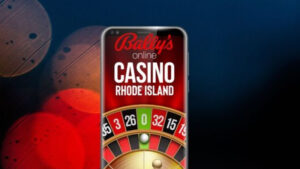
Rhode Island has become the seventh state to launch an online casino market with the opening of Bally’s online casino on Tuesday. The new Rhode Island online casinos market will, […]
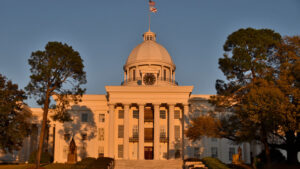
The gambling bill that aimed to put a comprehensive Alabama gambling law reform proposal before voters in November has stalled in the state Senate this week. HB151 and 152 call […]

Nevada’s January gambling revenues fell significantly on December 2023’s numbers. But operators still (just) hit a new record for the first month of the year. In total, all the Nevada […]
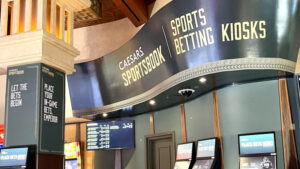
Eight North Carolina online sports betting operators are getting ready to launch on March 11. But one sportsbook has been able to jump the gun and make a limited launch […]
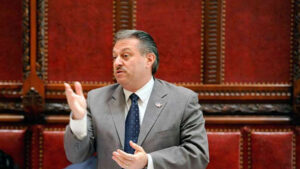
The Senator behind the recent — and most likely failed push to legalize online casinos in New York– has set up an open online meeting to discuss gambling addiction and […]
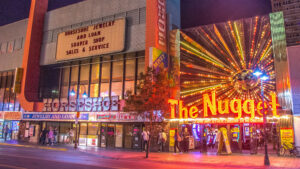
In a recent piece on the long-debated issue of online casino market cannibilization in the U.S, we discussed the demographic differences between physical casino customers and online gamblers. One thing […]

Caesars Digital, the online gambling arm of Nevada-based Caesars Entertainment, has signed two partnerships this week to expand its brand. The two deals will enhance its live dealer casino offering […]
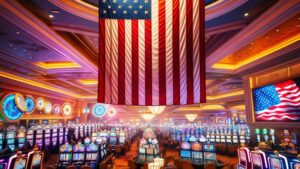
The U.S. commercial gambling business (excluding tribal casinos and state lotteries) reached a third straight record year of revenues in 2023. That’s according to the newly-released 2023 report from leading […]
Are you ready to take your online gambling experience to the next level? Sign up for the LetsGambleUSA newsletter and get the latest news, exclusive offers, and expert tips delivered straight to your inbox.